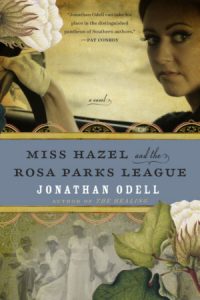Book Group Guide
The questions that follow are intended to enhance your group’s reading and discussion of MISS HAZEL AND THE ROSA PARKS LEAGUE by Jonathan Odell
Questions
1. Both Floyd and Hazel are driven to leave their homes in the hills. What is it they are in such a rush to escape? Are they both fleeing from the same things? How realistic are their dreams?
2. The novel centers on Hazel and Vida as young mothers with flashbacks to their childhoods. How essential are the early years to our understanding of these women as adults?
3. Discuss Hazel’s inability to belong. Would she have had the same issues has she stayed on the farm? How do these issues take shape when she confronts the other wives of her new class and neighborhood?
4. Hazel’s quest for beauty became her only goal as a child when she realized she was unattractive. Why did beauty become the answer to all of her problems? What role does physical beauty play in this novel?
5. Consider Levi’s relationship with the Senator. Where do you see this type of relationship between people today?
6. When Hazel and Vida meet, they are both grieving a loss. How do their losses affect them as women? Do they have any empathy for each other’s loss? Are you able to identify with either or both of the women? How are they changed by their losses? Were these loses necessary to their growth?
7. Discuss the differences in Hazel and Vida’s expectations of the men in their lives.
8. How does Vida come to terms with the hostility she faces from Hazel’s son Johnny? What do you imagine will become of young Johnny? Why do you suppose he was so fearful in the beginning? Why do you think Levi was able to reach him?
9. Consider the ways Hazel finds freedom as well as the times she requires rescuing. What, if any, transformations does she undergo throughout the course of this novel?
10. Consider the same questions for Vida.
11. Women are a central element to the society of Delphi. Odell paints a portrait of the what was considered the 1950s ideal woman throughout this novel. Where does Hazel fit into this ideal at the beginning at the novel and then at the end? What, if any, elements of the stereotypical 1950s woman remains today?
12. Why is Hazel so attracted to the maids? Why is Vida so repulsed by the white women? How is each group of women portrayed differently?
13. How does rhe balance of power in the relationships in the novel’s characters relationships change over the course of the novel?
14. Ponder the perceptions of sanity and insanity portrayed through the characters of Hazel and Levi Snow. How is the label of crazy the same or different for each?
15. What do you imagine for the future of Nate? Will he ever learn the truth and how might that change him if he did?
16. The novel is set largely in 1955. How much do you believe we have changed as a country when it comes to issue of race? As you noticed examples of racism did you recognize incidents from your own life or from the lives of family members of close friends?
17. What were some instances of “internalized” racism (racist beliefs that have been accepted as true by the victims themselves) on the part of Odell’s black characters?
18. If you were to choose either Vida or Hazel as a mother, who would be your choice? Would one make a better mother in contemporary times than the other? Do you think the women had other choices in their given situations?
19. In retrospect, did Vida make a good choice for Nate by “sending him away” consequently growing up as “white” in the North or should she have kept him near her in the Jim Crow south where he would have had grown up as “black”?
20. How does Hazel get her dignity back? What role does Pearl play in that process? How does Hazel’s relationship with her husband change because of this? Do you think her actions are justified?
21. Has Odell offered you a deeper understanding of the civil rights movement that were missed in your textbooks? Do you believe this or any novel or film can help move us toward ending predudice? Can you offer examples of books of films that made you see the world differently?
22. Last year was the fitieth anniversay of the 1964 Freedom Summer in Mississippi, a summer when local black activists initiated a massive voter registration drive. That summer hundreds of northern white college students came to help. What was the influence of these white students who came down? Some say their impact was largely because, in the eyes of the nation, the lives of the white students killed while trying to register voters had greater value while Blacks who had been fighting back, while being attacked, raped, and killed, trying to change a system

